+ Open data
Open data
- Basic information
Basic information
| Entry | Database: PDB / ID: 6cet | ||||||||||||||||||||||||
|---|---|---|---|---|---|---|---|---|---|---|---|---|---|---|---|---|---|---|---|---|---|---|---|---|---|
| Title | Cryo-EM structure of GATOR1 | ||||||||||||||||||||||||
 Components Components |
| ||||||||||||||||||||||||
 Keywords Keywords | SIGNALING PROTEIN / mTORC1 amino-acid sensing lysosome growth control | ||||||||||||||||||||||||
| Function / homology |  Function and homology information Function and homology informationGATOR1 complex / aorta morphogenesis / TORC1 signaling / Amino acids regulate mTORC1 / cardiac muscle tissue development / negative regulation of TOR signaling / vacuolar membrane / ventricular septum development / negative regulation of kinase activity / roof of mouth development ...GATOR1 complex / aorta morphogenesis / TORC1 signaling / Amino acids regulate mTORC1 / cardiac muscle tissue development / negative regulation of TOR signaling / vacuolar membrane / ventricular septum development / negative regulation of kinase activity / roof of mouth development / positive regulation of autophagy / negative regulation of TORC1 signaling / cellular response to amino acid starvation / GTPase activator activity / small GTPase binding / lysosome / intracellular signal transduction / lysosomal membrane / protein-containing complex binding / perinuclear region of cytoplasm / cytosol Similarity search - Function | ||||||||||||||||||||||||
| Biological species |  Homo sapiens (human) Homo sapiens (human) | ||||||||||||||||||||||||
| Method | ELECTRON MICROSCOPY / single particle reconstruction / cryo EM / Resolution: 4.4 Å | ||||||||||||||||||||||||
 Authors Authors | Shen, K. / Huang, R.K. / Brignole, E.J. / Yu, Z. / Sabatini, D.M. | ||||||||||||||||||||||||
| Funding support |  United States, 7items United States, 7items
| ||||||||||||||||||||||||
 Citation Citation |  Journal: Nature / Year: 2018 Journal: Nature / Year: 2018Title: Architecture of the human GATOR1 and GATOR1-Rag GTPases complexes. Authors: Kuang Shen / Rick K Huang / Edward J Brignole / Kendall J Condon / Max L Valenstein / Lynne Chantranupong / Aimaiti Bomaliyamu / Abigail Choe / Chuan Hong / Zhiheng Yu / David M Sabatini /  Abstract: Nutrients, such as amino acids and glucose, signal through the Rag GTPases to activate mTORC1. The GATOR1 protein complex-comprising DEPDC5, NPRL2 and NPRL3-regulates the Rag GTPases as a GTPase- ...Nutrients, such as amino acids and glucose, signal through the Rag GTPases to activate mTORC1. The GATOR1 protein complex-comprising DEPDC5, NPRL2 and NPRL3-regulates the Rag GTPases as a GTPase-activating protein (GAP) for RAGA; loss of GATOR1 desensitizes mTORC1 signalling to nutrient starvation. GATOR1 components have no sequence homology to other proteins, so the function of GATOR1 at the molecular level is currently unknown. Here we used cryo-electron microscopy to solve structures of GATOR1 and GATOR1-Rag GTPases complexes. GATOR1 adopts an extended architecture with a cavity in the middle; NPRL2 links DEPDC5 and NPRL3, and DEPDC5 contacts the Rag GTPase heterodimer. Biochemical analyses reveal that our GATOR1-Rag GTPases structure is inhibitory, and that at least two binding modes must exist between the Rag GTPases and GATOR1. Direct interaction of DEPDC5 with RAGA inhibits GATOR1-mediated stimulation of GTP hydrolysis by RAGA, whereas weaker interactions between the NPRL2-NPRL3 heterodimer and RAGA execute GAP activity. These data reveal the structure of a component of the nutrient-sensing mTORC1 pathway and a non-canonical interaction between a GAP and its substrate GTPase. | ||||||||||||||||||||||||
| History |
|
- Structure visualization
Structure visualization
| Movie |
 Movie viewer Movie viewer |
|---|---|
| Structure viewer | Molecule:  Molmil Molmil Jmol/JSmol Jmol/JSmol |
- Downloads & links
Downloads & links
- Download
Download
| PDBx/mmCIF format |  6cet.cif.gz 6cet.cif.gz | 337.6 KB | Display |  PDBx/mmCIF format PDBx/mmCIF format |
|---|---|---|---|---|
| PDB format |  pdb6cet.ent.gz pdb6cet.ent.gz | 258.7 KB | Display |  PDB format PDB format |
| PDBx/mmJSON format |  6cet.json.gz 6cet.json.gz | Tree view |  PDBx/mmJSON format PDBx/mmJSON format | |
| Others |  Other downloads Other downloads |
-Validation report
| Summary document |  6cet_validation.pdf.gz 6cet_validation.pdf.gz | 758.7 KB | Display |  wwPDB validaton report wwPDB validaton report |
|---|---|---|---|---|
| Full document |  6cet_full_validation.pdf.gz 6cet_full_validation.pdf.gz | 782.8 KB | Display | |
| Data in XML |  6cet_validation.xml.gz 6cet_validation.xml.gz | 50.4 KB | Display | |
| Data in CIF |  6cet_validation.cif.gz 6cet_validation.cif.gz | 76.8 KB | Display | |
| Arichive directory |  https://data.pdbj.org/pub/pdb/validation_reports/ce/6cet https://data.pdbj.org/pub/pdb/validation_reports/ce/6cet ftp://data.pdbj.org/pub/pdb/validation_reports/ce/6cet ftp://data.pdbj.org/pub/pdb/validation_reports/ce/6cet | HTTPS FTP |
-Related structure data
| Related structure data |  7465MC  7464C  6cesC M: map data used to model this data C: citing same article ( |
|---|---|
| Similar structure data |
- Links
Links
- Assembly
Assembly
| Deposited unit | 
|
|---|---|
| 1 |
|
- Components
Components
| #1: Protein | Mass: 43711.395 Da / Num. of mol.: 1 Source method: isolated from a genetically manipulated source Source: (gene. exp.)  Homo sapiens (human) / Gene: NPRL2, TUSC4 / Cell line (production host): 293F / Production host: Homo sapiens (human) / Gene: NPRL2, TUSC4 / Cell line (production host): 293F / Production host:  Homo sapiens (human) / References: UniProt: Q8WTW4 Homo sapiens (human) / References: UniProt: Q8WTW4 |
|---|---|
| #2: Protein | Mass: 63680.820 Da / Num. of mol.: 1 Source method: isolated from a genetically manipulated source Source: (gene. exp.)  Homo sapiens (human) / Gene: NPRL3, C16orf35, CGTHBA, MARE / Cell line (production host): 293F / Production host: Homo sapiens (human) / Gene: NPRL3, C16orf35, CGTHBA, MARE / Cell line (production host): 293F / Production host:  Homo sapiens (human) / References: UniProt: Q12980 Homo sapiens (human) / References: UniProt: Q12980 |
| #3: Protein | Mass: 181478.000 Da / Num. of mol.: 1 Source method: isolated from a genetically manipulated source Source: (gene. exp.)  Homo sapiens (human) / Gene: DEPDC5, KIAA0645 / Cell line (production host): 293F / Production host: Homo sapiens (human) / Gene: DEPDC5, KIAA0645 / Cell line (production host): 293F / Production host:  Homo sapiens (human) / References: UniProt: O75140 Homo sapiens (human) / References: UniProt: O75140 |
-Experimental details
-Experiment
| Experiment | Method: ELECTRON MICROSCOPY |
|---|---|
| EM experiment | Aggregation state: PARTICLE / 3D reconstruction method: single particle reconstruction |
- Sample preparation
Sample preparation
| Component | Name: GATOR1 / Type: COMPLEX / Entity ID: all / Source: MULTIPLE SOURCES |
|---|---|
| Molecular weight | Value: 0.29 MDa / Experimental value: NO |
| Source (natural) | Organism:  Homo sapiens (human) Homo sapiens (human) |
| Source (recombinant) | Organism:  Homo sapiens (human) Homo sapiens (human) |
| Buffer solution | pH: 7.4 |
| Specimen | Embedding applied: NO / Shadowing applied: NO / Staining applied: NO / Vitrification applied: YES |
| Vitrification | Cryogen name: ETHANE |
- Electron microscopy imaging
Electron microscopy imaging
| Experimental equipment |  Model: Titan Krios / Image courtesy: FEI Company |
|---|---|
| Microscopy | Model: FEI TITAN KRIOS |
| Electron gun | Electron source:  FIELD EMISSION GUN / Accelerating voltage: 300 kV / Illumination mode: FLOOD BEAM FIELD EMISSION GUN / Accelerating voltage: 300 kV / Illumination mode: FLOOD BEAM |
| Electron lens | Mode: BRIGHT FIELD |
| Image recording | Electron dose: 55 e/Å2 / Detector mode: SUPER-RESOLUTION / Film or detector model: GATAN K2 QUANTUM (4k x 4k) |
- Processing
Processing
| Software | Name: PHENIX / Version: 1.12_2829: / Classification: refinement | ||||||||||||||||||||||||
|---|---|---|---|---|---|---|---|---|---|---|---|---|---|---|---|---|---|---|---|---|---|---|---|---|---|
| CTF correction | Type: PHASE FLIPPING AND AMPLITUDE CORRECTION | ||||||||||||||||||||||||
| Symmetry | Point symmetry: C1 (asymmetric) | ||||||||||||||||||||||||
| 3D reconstruction | Resolution: 4.4 Å / Resolution method: FSC 0.143 CUT-OFF / Num. of particles: 309773 / Symmetry type: POINT | ||||||||||||||||||||||||
| Refine LS restraints |
|
 Movie
Movie Controller
Controller




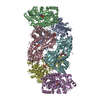
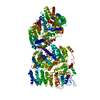
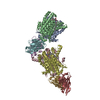
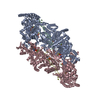
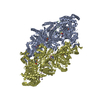
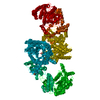
 PDBj
PDBj

